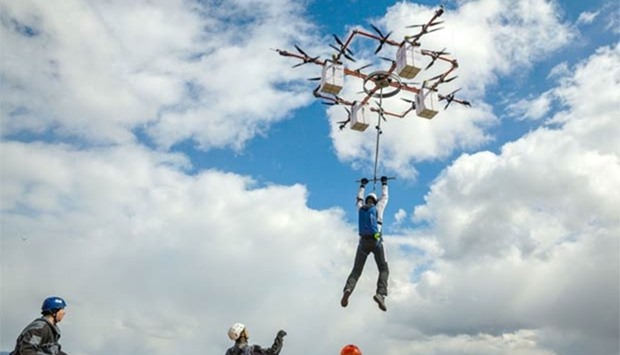A Latvian tech company is claiming a world first after successfully test-flying a super-powered drone which lifted a daredevil skydiver aloft, from where he parachuted safely back down to earth.
Manufacturer Aerones performed the feat this week in a secret "drone-diving" operation in a wild, isolated central region of the Baltic state to which AFP had exclusive access.The powerful drone measuring 3.2 square metres sports 16 rotors. Weighing 70 kilogrammes, it can lift up to 200 kilos.
The same drone was used in January to debut "drone-boarding" by towing snowboarders at high speed across a frozen Latvian lake.
But this week's operation was even more perilous with the drone collecting a man from the top of a tower and then lifting him some 330 metres into the air.
After testing the drone by lifting and dropping a dead weight of 90 kilogrammes, it was the turn of daredevil skydiver Ingus Augstkalns to literally take the plunge as what is believed to be the world's first "drone-diver".
"It was so much fun -- like being in a playground in childhood," Augstkalns told AFP.
"Of course there were still risks in doing it the first time.
"Being lifted the first five metres was probably the most nervous moment, but the drone lifted me... and two seconds later I was under the (parachute) canopy."
Aerones CEO Janis Putrams, who was in charge of the drone controls, told AFP "You no longer need a helicopter" to skydive.
"Today we did the first drone jump, a completely new way of base jumping. It makes it possible to base jump from any place -- in cities, in desert, in mountains," he added.
But as well as the extreme sports potential of drone-diving, the company hopes to exploit the drone's abilities to perform rescue operations, for instance of people trapped on the roof of a burning building or other difficult-to-reach locations.
"We're aiming at using it for human rescue, so today was a good test," Putrams said.
He and his team of engineers first came up with the idea of building the heavy-duty drone two years ago.
It cost €35,000 ($37,000) to build and for now, flight times are restricted to around 10 minutes using on-board batteries.
In theory the top speed is around 150 kilometres per hour, but piloting becomes difficult at that velocity, so drone-boarding and drone-diving daredevils have to make do with speeds of around 60 kph.

